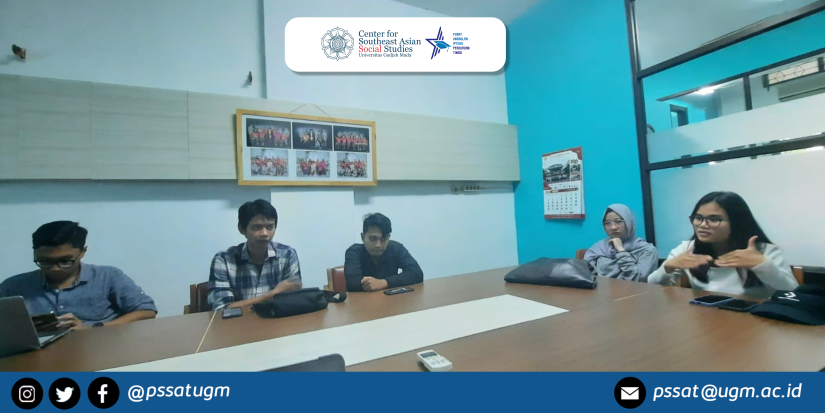
On 15 March 2023, CESASS student interns conducted a weekly sharing session at the PAU Building. Putu Prisca Lusiani, a postgraduate student from the International Relations Department at Fisipol UGM, volunteered as the speaker for this week’s session, titled “Indonesia’s Chairmanship in ASEAN 2023: What to Expect?” She considered the topic relevant because Indonesia is the largest member country of ASEAN. Thus, other member countries expect Indonesia to be able to solve several problems that have happened over the decades, including the political instability in Myanmar.
Prisca commenced by asserting ASEAN as the epicentre of global stability. Due to that strategic position, ASEAN shall consistently enforce the international law and avoid being a proxy to any superpower countries, whether China or the United States. Besides that, ASEAN should shape Southeast Asia as a region with dignity that upholds human rights, including democracy.
However, Indonesia’s chairmanship of ASEAN is a tall order because of the political instability in Myanmar, particularly regarding the humanitarian crisis of the Rohingya ethnic group that resides in the Rakhine State. Two years after the military junta, Myanmar’s situation becomes the elephant in the room, and ASEAN is questioned about its role. Besides Indonesia’s difficulty, in February, the ASEAN Foreign Ministers’ Retreat included a follow-up on the Five-Point Consensus. The topics of the legitimacy of Myanmar’s military representation in attending ASEAN meetings and the next steps for the Special Envoy were expected to be addressed. Still, the output was a statement on creating a conducive environment for an inclusive dialogue.
Furthermore, Prisca divided ASEAN member countries’ responses on Myanmar into three: 1) the more proactive that is comprised of Indonesia, Malaysia and Thailand; 2) the less proactive that is comprised of Singapore, the Philippines and Brunei; 3) the silent ones that are comprised of Vietnam, Laos and Cambodia. The proactive member countries tend to accept thousands of refugees from Myanmar and are directly affected by Myanmar’s instability. The less proactive member countries are still affected by Myanmar, even though the scale is much more limited. The countries that did not have any stance are primarily unaffected by Myanmar.
With such polarisations within ASEAN member countries, Prisca highlighted the importance of the “ASEAN Way,” a decision-making process emphasising discussion and consensus. It stresses equality within all ASEAN member countries and the importance of cooperation, despite taking a long period to reach a consensus. The four main elements of the ASEAN Way are: 1) non-interference; 2) non-use of force; 3) quiet diplomacy; and 4) a consensus approach. However, Prisca criticised the non-interference principle of ASEAN because, in practice, it makes ASEAN fail to solve grave human rights violations.
Prisca ended her presentation by discussing the two socio-cultural pillars of the ASEAN Community: 1) access to basic needs and education; and 2) building awareness and a sense of one identity. As stipulated in the ASCC Blueprint 2009, the concrete implementation of those pillars includes advocating for equal opportunity in education and encouraging the deepening of tolerance amongst ASEAN peoples.
After the presentation, the interns discussed the news about Rohingya refugees stranded in Aceh. The discussion also revolved around Myanmar’s history and the current socio-cultural makeup, which was explained thoroughly by Phoo from Myanmar. Not only issues regarding refugees, interns also inquired about other actual ASEAN problems, such as security, narcotics abuse and a decreased democracy.
By: Wiweko Rahadian Abyapta
